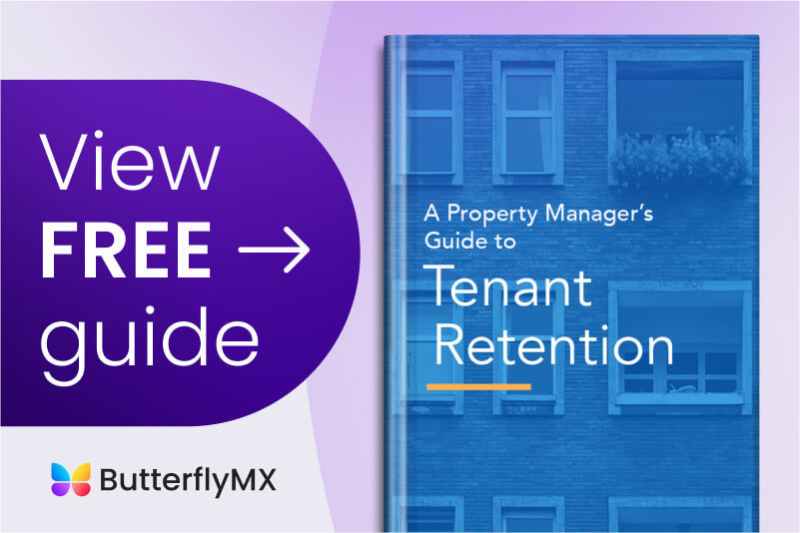Key takeaways
- A resident referral program is an incentive-based program that offers perks and encourages tenants to refer their friends and family to your building.
- A resident referral program can significantly reduce tenant turnover and convert to long-term leases.
- Offering desirable perks for residents and referrals helps you build a stronger relationship with new and existing renters.
- The best way to build a strong resident referral program is by determining eligibility rules, keeping track of all referrals, and following up with residents.

Appeasing your residents is an important part of building a strong apartment community. In fact, the friends, family, and coworkers of current residents are usually already familiar with your community. So, implementing a resident referral program is a great way to improve resident retention. And you’ll do this while filling vacancies with quality prospects.
Read on to learn about what a resident referral program is. Then, discover the benefits of resident referral programs plus 10 ways to implement an effective resident referral program.
In this post, we cover:
- What is a resident referral program?
- Benefits of a resident referral program
- 10 ways to implement a resident referral program
What is a resident referral program?
A resident referral program is an incentive-based program that offers perks for residents when they refer others to rent at your building. These referrals are usually the friends, family, and coworkers of residents.
As a result, these prospects are more reliable than prospects found online or on listing sites. What’s more, tenants found through resident referrals usually convert to more long-term leases.

Benefits of a resident referral program
Word-of-mouth marketing is one of the most reliable ways to find high-quality residents. So, building a strong resident referral program is a great way to secure new, long-term tenants.
Here are a few of the key benefits of implementing a tenant referral program:
- Reduce tenant turnover. Managing tenant churn is one of the most important jobs of a property manager. A strong resident referral program can significantly reduce the time it takes to find new tenants for vacant units.
- Reduce resident acquisition costs. Relying solely on listing sites and other rental platforms costs you time and money. Resident referral programs reduce these costs by using your residents’ network of family, friends, and colleagues to fill vacancies.
- Attract quality residents. Referrals usually have a close relationship with current residents. So, they’ll likely be familiar with your property and its rules. This helps streamline the move-in process for referrals while reducing the likelihood that they’ll be a disruptive new tenant.
- Reward current residents. Implementing a comprehensive resident referral program is a great way to keep renters happy. Offer desirable perks and rewards like a resident referral bonus to build a better relationship with both long-term residents and their referrals.
- More lease renewals. Residential referral programs incentivize residents to use their personal network for referrals. So, current residents are more likely to renew their old leases. Rental demand has soared in recent years, but that’s no reason to stop promoting your property. An effective tenant referral program helps fill vacancies and leads to quality, long-term residents.

10 ways to implement a resident referral program
So you’ve decided to implement a resident referral program at your building. But how do you carry it out effectively?
Here are 10 useful strategies for building a great resident referral program:
- Offer incentives
- Promote the program
- Determine rules for eligibility
- Include clear instructions
- Educate leasing staff
- Create a landing page for your site
- Keep track of referrals
- Follow-up with residents
- Host events and mixers
- Show your appreciation
1. Offer incentives
Offering incentives like cash bonuses or rent credit for residents and referrals will motivate residents and prospects to participate. Gift cards to local businesses or tickets to sporting events in the area are also great resident referral program ideas.
Additionally, quarterly sweepstakes and raffles are great at getting current residents excited about the program.
2. Promote the program
Spread the word about the new program.
Send an email to current residents and promote it in your apartment newsletter. This will ensure that all of your residents know about the program and motivate them to make referrals. You can also include the information in a resident referral program flyer that you place in high-traffic areas at your property.
3. Determine rules for eligibility
Establish clear rules to qualify for the program. Requiring residents who participate in the referral program to be up-to-date with rent payments will lead to higher-quality prospects. Moreover, a resident referral program may incentivize residents to stay current on payments so they can participate in future sweepstakes.
Pro tip: Make sure that all referrals participating in the program qualify. This will lead to better referrals and help weed out unsuitable prospects.
4. Include clear instructions
Include valuable information like where and how to submit referrals. This will reduce confusion and help streamline the program. Additionally, make it clear when the resident and referral can expect to receive their apartment referral bonus or other perks.
With this in mind, establish rules including limits on the number of referrals a resident can submit in a given period.
5. Educate leasing staff
Ensure that all staff members are on the same page about how the referral program works. Do this by hosting a meeting informing them on how to implement it.
In addition, this will also empower your staff to accurately answer resident questions about how the referral process works.
6. Create a landing page for your website
Create a landing page on your website to increase awareness so that all residents know about the referral program. Solely relying on emails to send out information can easily get lost in spam folders or forgotten.
In addition to sending out a building-wide email about the program, add a link to the apartment referral program on your site’s homepage to ensure that more of your residents know where to apply.
7. Keep track of referrals
Keep a detailed log of all approved and denied referrals — and notify both current residents and prospects accordingly. Promptly notify residents and referrals on whether their submission has been approved or denied to reduce the likelihood of missing out on prospects.
Explore our complete guide to real estate social media marketing:
8. Follow-up with residents
Follow up with residents via email so that they stay updated on the status of their applications. Keeping residents updated will not only keep them in the loop but will also improve your relationship with them.
What’s more, following up with residents promptly will increase the likelihood of them referring more people in their network in the future.
Pro tip: Send a tenant welcome letter following the approval of a referral’s application to kick-start the welcome process.
9. Host events and mixers
Consider hosting events and mixers for both residents and prospects at your property. This will allow you to inform residents and referrals about how the program works and its perks. What’s more, it’ll also allow you to get to know prospective residents face-to-face.
Furthermore, hosting mixers at your multifamily building will familiarize prospective tenants with your property. This allows you to build a better relationship with them — before they even sign a lease.
What’s more, these events will also empower you to offer tours of amenity spaces and vacant units to motivate referrals to apply for your building.
10. Show your appreciation
Show your appreciation by following up with residents via email regardless of whether their referral was approved. Additionally, sending a thank-you email or letter when a resident’s referral is approved will help you build a better relationship with current residents.







